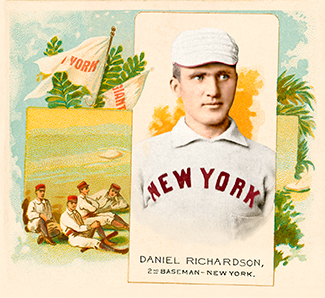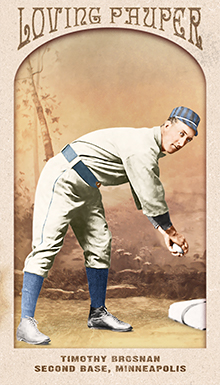
- Series: 1880s: Loving Paupers
- City: Minneapolis
- Team: Millers
- League: Western Association
Timothy J. Brosnan spent his entire professional baseball career in the minors, primarily as a second baseman. His first recorded teams, in 1884, were Springfield of the Massachusetts State Association and Rockville of the Connecticut State League. He moved to Lawrence of the Eastern New England League in '85 and also played for Brockton of the New England League. He was moving up in class at Lawrence where ten of his sixteen known teammates would see action in the majors. His stint at Brockton put Brosnan into even more elite company. Bill McGunnigle, who would go on to a managerial role in Brooklyn, was a pitcher/outfielder and Tommy Bond, then on the downside of a fine career in Boston, was a Brockton mainstay in the pitcher's box. In all, nearly two dozen of the '86 squad had been or would be big leaguers. 1886 was a significant dividing line in Tim's pro tenure. He left New England for the Southern Association's Charleston club. He played in the most games of any on the Seagulls despite a struggling .228 average. The following year saw Brosnan move to the midwest where he would conclude his professional endeavors. Tim joined the Des Moines Hawkeyes for the '87 campaign and again proved his durability, leading the team with 123 games played and compiling a very fine .317 average. With the Minneapolis Millers in '88 Brosnan's average declined to .254 but he was a regular. Tim's final move took him to Sioux City later that season and he would remain a Corn Husker for the final two years of his career.
- Brosnan hit .275 in '89, his last full year
- Tim was captured by the Old Judge crew in 1888 in his Millers' uniform — six poses depicting a right-hander at bat and afield
Auction History
Cartophilia
Old Judge Pose: 41-2
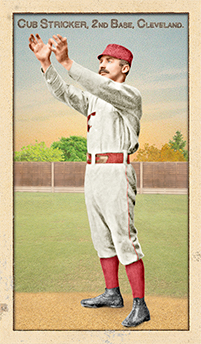
- Series: Beginnings: 1880's
- City: Cleveland
- Team: Spiders
- League: National League
John A. Stricker (nee Streaker) (1859-1937) played second base over an eleven year career in the majors. The native Philadelphian broke in with his hometown Athletics in 1882 and stayed for four seasons. He never caught fire in Philly, batting a meager .239 during his tenure there. The Athletics consigned Cub to the Southern Association’s Atlanta squad before the 1886 season. The following year Stricker was dealt to Cleveland. During his time on the shores of Lake Erie, Stricker saw the team morph from the American Association’s Blues to the NL’s Spiders and, in the 1890 uprising of the Players’ League, Cub became an Infant. He boosted his average a bit and was much more productive on offense overall. He emerged as a fairly adept base-stealer, swiping 86 in his first year with the Blues, his best on the basepaths for his career. Having never been a regular with the Athletics, Stricker was an everyday player throughout his time in Ohio and continued that pattern in 1891 when he moved to Boston with the AA’s Reds. Thereafter, Cub’s performance and plate appearances dwindled rapidly and he bounced from club to club for the remainder of his big league experience. Two episodes late in his career give evidence of a fiery temperament that made Stricker a durable competitor and even gave him a shot at managing while sometimes exposing a darker side. On at least two occasions Cub couldn’t resist the baiting of rowdy fans. His tour as manager of the Browns ended when, after a losing streak, Stricker leaped into the stands to punch a heckler. With the Senators in ‘93, in a game back home in Philadelphia, he couldn’t abide the fans’ jeers. He claimed later that the ball he loosed into the stands was meant to hit only the low fence. Unfortunately, it bounced into the stands and broke the nose of a paying customer, leading to Stricker’s arrest.
- Out of the majors following his contretemps, Cub played minor league ball for several more years, primarily in Providence for the Clamdiggers/Grays into 1896. He had a final go of it with Chester of the Pennsylvania State League in 1901 at the ripe age of 42
- Stricker received the nickname Cub due to his diminutive stature
- Stricker enjoys four known poses in the Old Judge canon, but is credited with six different cards as two cards are known in two different cropped-image variations each.
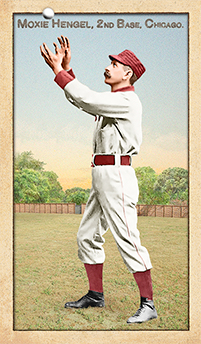
- Series: Beginnings: 1880's
- City: Chicago
- Team: Maroons
- League: Western Association
Emery J. Hengel (1857-1924) had brief stints in major league baseball during parts of the 1884 and 1885 seasons. Moxie signed on as an infielder with his hometown's entry in the upstart Union Association, whose Browns sought to compete with the renowned Chicago White Stockings. The experiment failed and, by August, the club had moved to Pittsburgh (as the Stogies) and lasted until September 18. Many of the players went to Baltimore's Monumentals, but Hengel landed in the Twin Cities with the St. Paul Saints (White Caps). That franchise's contribution to the UA amounted to eight games in total, all on the road. Moxie's anemic .152 average might have signaled a quick end to his would-be career, but he got one more chance - this time with the National League's Buffalo Bisons in what would be their final campaign in the majors. That 1885 season saw Hengel teaming with some real stars: first baseman Dan Brouthers, second baseman Davy Force, shortstop Jack Rowe, third baseman Deacon White, outfielder Hardy Richardson and pitcher-manager Pud Galvin were all on hand. Despite all that talent, the Bisons ended the year ahead of only the woeful St. Louis Maroons and were folded into the Detroit Wolverine club the following season. By this time, Moxie had achieved the dubious distinction of having been on the final rosters of four straight failed ball clubs within two years - and Moxie's days in the Show were over. Undeterred, Hengel returned to the minors, playing for the Utica Pent-Ups, Chicago Maroons, Minneapolis Millers and others before closing his pro tenure with the Minneapolis Minnies of the Western League in 1894 at age 36. In '92 Moxie made a stop in Michigan with the Ishpeming-Negaunee Unions of the Wisconsin-Michigan League, a team that, thankfully, never had to recruit a radio broadcaster.
- Moxie's first major league manager was Ed Hengel. One of three managers for the Chicago Browns in 1884, Ed managed the team to 34 wins and 39 losses. Ed was also born in Chicago and just two years before Moxie. While it's hard to imagine the two were not related, research has not revealed any familial connection.
- Moxie's batting average for his three big league teams was .180. He hit no home runs but did manage three doubles and two triples in his 35 games
- Moxie may have been a better leader than ballplayer: He managed the Chicago Maroons in 1888 and the Minneapolis Millers (road games only) in 1889
- The first release of this card (January, 2017) was likely an error: Hengel was misspelled as "Hengle." This is actually a common mistake for Moxie and it has caused a fair amount of confusion through the years. The Old Judge editors spelled his name "Hengle" and his Wikipedia entry uses the two spellings interchangeably. Deeper research indicates that "Hengel" is the most likely spelling. All subsequent releases of this card will feature the name "Hengel."
- Series: 1888 Champion New York Giants
- City: New York
- Team: Giants
- League: National League
Daniel Richardson (1863-1926) played 2B and SS for the Giants, Grooms, Senators, and Colonels over an 11 year span. His stints with the NY Giants included one year when the team played in the Player’s League (’90). He contributed to two Giant league championships in ’88 & ’89.
- During his one year with the Washington Senators, Richardson was player/manager
- Achieved a career BA of .254 and stole 225 bases
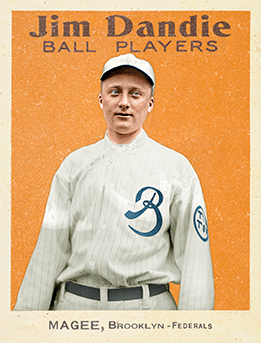
- Series: Jim Dandie Feds
- City: Brooklyn
- Team: Tip-Tops
- League: Federal League
Leo Christopher Magee (1889-1966) started his major league career in dramatic fashion as he and his Cardinal teammates helped rescue dozens of fellow passengers when their train wrecked in Connecticut. His manager Roger Bresnahan liked what he saw despite Magee's weak hitting, putting him in for the injured Miller Huggins at second and then moving him to left where he acquired the nickname “Flash.” Magee finished that 1911 season with a much improved batting average--.290--good for third on the team. Leo was a hothead, encountering numerous run-ins with umpires, squabbling with management over salary and even getting ejected mid-game for fighting—with teammate Ted Cather. Nevertheless, or perhaps because of his fiery style, John McGraw chose Magee as a member of a world-tour exhibition competing with Charles Comiskey's American Leaguers. He showed his flair for the dramatic could work on the field in a match in Medford, OR, when in pouring rain, he glided toward the line in left to make a grab while carrying an umbrella. The teams ended their circumnavigation of the globe aboard the Lusitania after their last games in England in March 1914. He was courted by the new Federal League Chicagos but remained with Mordecai Brown's Terriers for a fine season before finally jumping to the Brooklyn Tri-Tops in '15 where he also became, at 25, one of the youngest managers. He wasted no time demonstrating his temper, getting ejected in the first inning of the home opener. The experiment of trying such a youngster in the pilot's role failed as Lee's tough style alienated his veteran players and fans alike. His skill at bat and afield caused old mate Huggins, now managing the Yankees, to bring Magee aboard for the 1916 season. Huggins termed Lee “the prize of the Federal League collection.” Salary disputes, unsavory associations and union activity all combined to cast a long shadow over Magee's latter years. Finally, in 1919, he was ousted from the game with Hal Chase for allegations of throwing a game.
- Despite a fine career average of .276 in nine seasons, Magee's tenure ended ignominiously due to a jury verdict that proved the precursor to MLB's crusade against gambling which culminated the next year in the Black Sox affair



